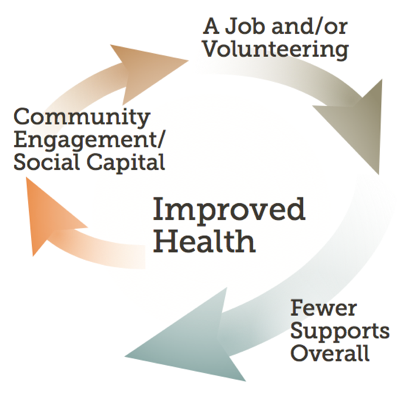Big, Fat Problem
Watch The Perfect Storm Roiling the Human Services Industry.
The poor clinical health of individuals served by the human services industry is rapidly gaining increased scrutiny and penalty. As one glaring example, people with intellectual and developmental disabilities (I/DD) represent 1% of the Medicaid caseload and approximately 11% of Medicaid’s expenses; such lopsidedness begs for immediate change.
Medicaid and the American public are essentially on a slippery slope funding non-nutritious foods and then underwriting resulting, costly illness—obesity, diabetes, hypertension, and a variety of additional acute care conditions. Add on that social determinants of health cannot progress forward for people supported as a result of these dismal circumstances and it's clear why managed care is assigning responsbility and insisting on change from providers, the first-line of health care delivery; click here to read our co-founder's white paper.
Please scroll down to learn why human services organizations are rapidly becoming health care entities.

People supported in LTSS settings unnecessarily struggle with obesity, diabetes and hypertension at approximately three times the rates experienced by the general population. While pharmacological and environmental complications are a factor to consider, it has been demonstrated that most of these unhealthy conditions are reversible for a majority of the population. In fact, the primary cause behind much of the subpar wellness is simply due to eating the wrong foods in the wrong amounts. And while exercise is always advisable for cardio and toning, health care experts concur that improved wellness can’t typically be achieved—and maintained—unless mealtime habits change.
Empirical and stastical evidence further indicate that:
• Annual health care costs for people with IDD living in community-based LTSS settings typically range between $25,000-$40,000.
• Health care costs for obese Medicaid recipients are $2,000 per annum higher than non-obese Medicaid recipients.
• Individuals with IDD who focus on improved nutrition and better health reduce medication utilization as well as ER and acute care usage by 10 to 20 percent.
Clearly, choice can no longer mean allowing people supported to eat themselves into a poor quality of life and life-threatening illness. Whether it’s managed care, value-based reimbursement, state clawbacks, or HHS/CMS mandates, providers supporting Medicaid-based populations—particularly those comprising the highest risk and highest cost—will be required to demonstrate better health outcomes. To do otherwise is no longer financially, or morally, feasible; health care costs are starting to outstrip long term services and supports expense. “Free” food and health care are justifiably coming with stipulations related to responsibility. Proof of a simple, better-nutrition outcomes measurement, perhaps such as normalized BMI, will be part of the deal.
People supported unnecessarily struggle with overweight conditions
Direct support workers—the first line of health care delivery for most people supported in community-based settings—have not been properly trained regarding wellness, nutrition, and kitchen skills in many instances. This elevates risk and compliance-related vulnerability and expense . . . click to read our co-founder's article here. Further, there is often a high turnover faction among these staff members, so that once any training is complete the position has turned over. And this personnel pool is often challenged by similar poor health and habits. Providers are faced with perpetual labor inefficiencies and escalating food and PRN medication costs; all are persistent drains on the operating budget in most organizations.
Many of the same poor-health and minimal-knowledge challenges face caregivers and family members who are helping people supported navigate the day-to-day and their improving health. As a result, even individuals with disabilities who are more independent are typically not armed with healthy habits, understanding regarding nutrition, and safe and appropriate kitchen skills.
In the midst of these big, fat problems and what’s looming on the increased-scrutiny horizon, there is very good news as a result of My25's Strategic Mealtime & Technology-Supported Mealtime approach and successes. Click to watch our overview video.
"Obesity and resulting diabetes are the only major health problems that are getting worse in this country, and they’re getting worse rapidly."
~ The Centers for Disease Control and Prevention
Watch Brian's Story to learn more about My25's substantial outcomes.

Better health is at the crux of reduced, overall supports.
 My25 is powered by Mainstay, Inc.
My25 is powered by Mainstay, Inc.